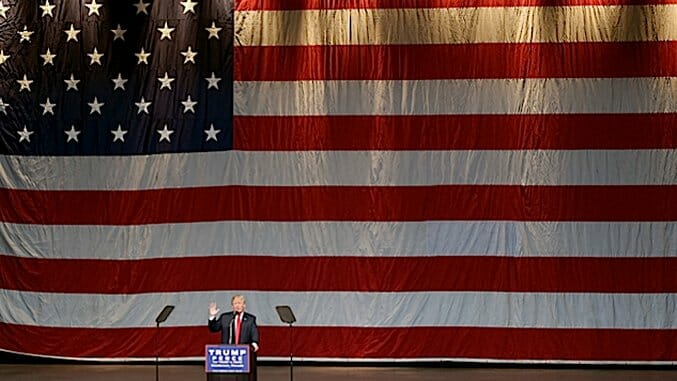The American Flag is a Symbol of Oppression
Photo by Ethan Miller/Getty
My father wears the American flag on his sleeve. Or rather, on his chest, on his legs, upon the fridge and upon his car. Somewhere in his closet are shirts and swim trunks adorned with the flag. Miniature flags hang around in the odd corners of the house. It’s the kind of imagery you expect from someone attending a Bob Seger concert, not an Arab-American man.
This has been on my mind these last few weeks, as pressure continues to come down on Colin Kapernick, a pro football player who refused to stand during the singing of the national anthem. His words make his intentions clear: “I am not going to stand up to show pride in a flag for a country that oppresses black people and people of color…there are bodies in the street and people getting paid leave and getting away with murder.” His actions have been followed by several other athletes kneeling during the anthem in solidarity with Kapernick, as well as a heavy backlash complete with racially derogatory comments. For Kapernick and his peers, it’s clear that the American flag, and its anthem, represent a country which operates on the oppression of its citizens.
The methods of this oppression have never been clearer than they are today. As Jon Schwarz at the Intercept explains, the anthem that Kapernick has refused to stand for is itself a celebration of slavery. Lyrics within the “Star-Spangled Banner” celebrate the deaths of slaves who sided with the British during the War of 1812, declaring “No refuge could save the hireling and slave / From the terror of flight or the gloom of the grave.”
Policing itself has long had ties to slavery as well, with police in the antebellum south being connected to organizations initially built to catch runaway slaves. This history continues today, alongside the school-to-prison pipeline and the prison-industrial complex, which see black children frequently removed from school at an early age, then sentenced under discriminatory policies to lifetimes in prison. From there, inmate labor is used to produce commodities—essentially at no cost. It’s a situation that has been frequently compared to slave labor, and has become the impetus for strikes across the U.S. as prisoners try to end the practice.
Also, it’s no secret that the nationalism often inspired by the flag has been associated with oppressive groups and practices throughout our history. White nationalist groups such as the Ku Klux Klan have always attached their sense of white identity to both Christianity and patriotism. Their ideology is often rooted in ideas of duty to God and Country. The Stars and Stripes has also been a frequent presence among the growing right-wing movement in the U.S. It accompanies slogans like “Make America Great Again” at Trump rallies, a declaration that, taken alongside Trump’s rhetoric, ties racist practice to the core of American identity. That same sense of identity can be seen again and again among other right-wing groups. How many conservative radio hosts and abrasive Twitter accounts have self-described as “patriots”, and signaled their loyalty with the flag?
-

-

-

-

-

-

-

-

-

-

-

-

-

-

-

-

-

-

-

-

-

-

-

-

-

-

-

-

-

-

-

-

-

-

-

-

-

-

-

-








































